|
|
|
Sort Order |
|
|
|
Items / Page
|
|
|
|
|
|
|
| Srl | Item |
| 1 |
ID:
189224
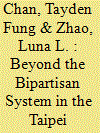

|
|
|
|
|
| Summary/Abstract |
Current literature on political marketing seldom investigates elections in non-Western regions or countries. The analysis of the Taipei mayoral elections (TMEs) can fill this academic vacuum. This article studies the election campaigns for the TMEs between 1994 and 2018 to understand and analyse the political marketing strategies used by candidates and political parties in Taiwan, an East Asian democracy. While the New Party (NP) stuck to a product-oriented strategy, the Kuomintang (KMT) and the Democratic Progressive Party (DPP) employed sales-oriented strategies in most TMEs. This article argues that political parties with strong ideologies find it hard to use the market-oriented electoral strategy. The victory of Ko Wen-je in 2014 and 2018 TMEs can be analysed in terms of the successful employment of a market-oriented strategy. However, given the changing environment of local politics, Ko and his party, the Taiwan People’s Party (TPP), may not follow market-oriented strategies in future TMEs.
|
|
|
|
|
|
|
|
|
|
|
|
|
|
|
|
| 2 |
ID:
175591
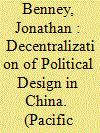

|
|
|
|
|
| Summary/Abstract |
Political posters, banners, and similar objects are extremely common in China. This article uses political design from contemporary China, particularly emphasising the government’s Chinese Dream campaign, to analyze what at first appears to be a paradox. The subjects of the campaigns and the language they use are mandated by the central government and promoted through central and local publicity departments. But the graphic aspects of these campaigns, such as the choice of colours, images, layout, and typeface, are much less strictly controlled, and are decided by local governments or authorities. This makes political design in China decentralized. Decentralized design is inconsistent with the principles of global marketing and with the PRC’s reliance on set forms of political discourse, both of which rely on the assumption that uniformity will lead to more effective communication of messages and persuasion of the public. Evidence from local design campaigns indeed shows that Chinese political posters are often designed hastily and without expertise, resulting in strange and unpersuasive images. Despite this, this article shows that decentralized design is not paradoxical. This is largely because the Chinese party-state uses propaganda as a method of “signalling” its overall power, more than as a tool of indoctrination or persuasion about particular topics. The central government’s reliance on incentives and metrics to regulate local authorities also means that the production of propaganda is also a means by which local governments can signal their loyalty to the Centre.
|
|
|
|
|
|
|
|
|
|
|
|
|
|
|
|
| 3 |
ID:
167854
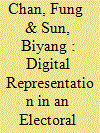

|
|
|
|
|
| Summary/Abstract |
Widely known by the public, the Chief Executive of Hong Kong is selected not by universal suffrage but by a 1,200-member Election Committee (EC). While candidates Carrie Lam, John Tsang, and Kwok-hing Woo all ran in the Chief Executive Election of 2017, only Lam received the blessing of authorities in the Mainland. Though Tsang had led the polls throughout the entire campaign and was popular on several social media platforms, a majority of EC members still cast their vote for Lam as Chief Executive. This was the first time that EC members voted against popular opinion in the Chief Executive Election. This paper analyzes the limited power of social media under elections that are under the influence of Mainland China. It also examines the problem of legitimacy in such electoral settings and the way in which authorities in the Mainland have influenced electoral outcomes through defects in the institutional systems of Hong Kong. The 2017 Chief Executive Election affirmed the tightened control of Mainland authorities over the affairs of Hong Kong.
|
|
|
|
|
|
|
|
|
|
|
|
|
|
|
|
| 4 |
ID:
153689
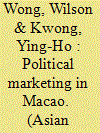

|
|
|
|
|
| Summary/Abstract |
To what extent can political marketing narrow the legitimacy gap for a hybrid regime? This article examines this question through the case of Macao (2009–14). It finds that political marketing is insufficient to compensate for lack of democratic reform and may easily backfire to expose the problem of a structural legitimacy deficit.
|
|
|
|
|
|
|
|
|
|
|
|
|
|
|
|
| 5 |
ID:
096939
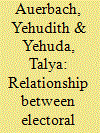

|
|
|
|
|
| Publication |
2010.
|
| Summary/Abstract |
This study explores the effects of changes in electoral systems on political marketing, and, more particularly, the impact of the shift from the parliamentary electoral system which has been in operation in Israel since 1948, to the presidentary (combined of elements from the parliamentary system, and the presidential system) on the two largest Israeli parties' marketing strategies. Out of 670 political broadcasts by Likud and Labour, 207 were examined for five out of the six electoral campaigns that took place since 1988: the 1988 and 1992 campaigns, before the switch to the presidentary system, the 1996 and 1999 campaigns after the establishment of the combined system and the 2003 campaign, after Israel changed back to the parliamentary electoral system. The findings supported the study's main arguments regarding the extent and direction of the impact of the change in the electoral system on the developments in political marketing. Beginning in 1996, there was a decrease in broadcasts presenting political issues and a sharp increase in broadcasts that focus on personality alone. Equivalently, the percentage of broadcasts addressing the centre of the political map, rather than distinct publics, grew significantly. In 2003, with the return to the parliamentary system, the marketing strategy of the two parties, and more particularly of the Labour Party, changed back to the pre-1992 pattern: a large percentage of the broadcasts focused on issues and not on the candidates' personalities, and addressed distinct target audiences rather than the centre.
|
|
|
|
|
|
|
|
|
|
|
|
|
|
|
|
|
|
|
|
|